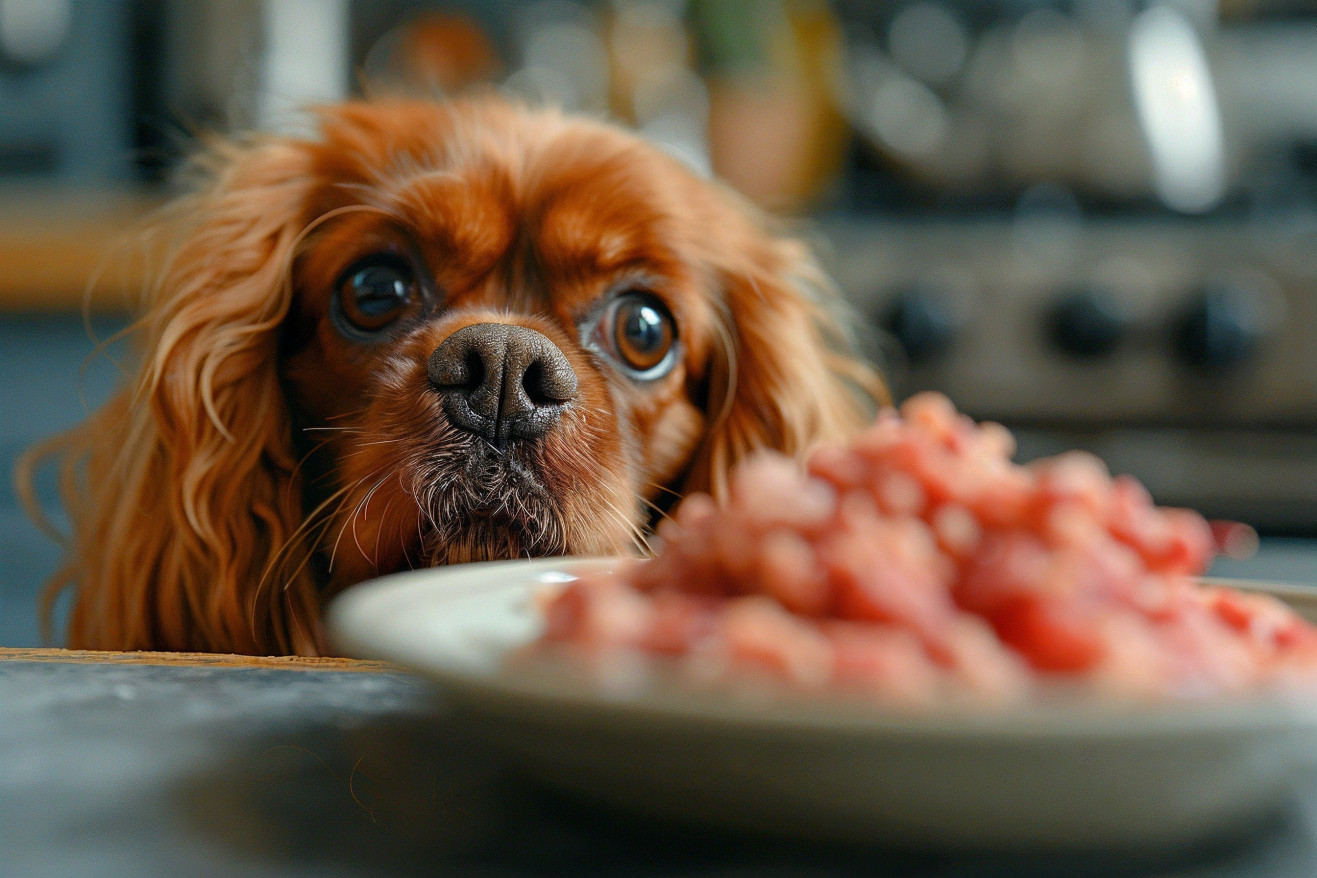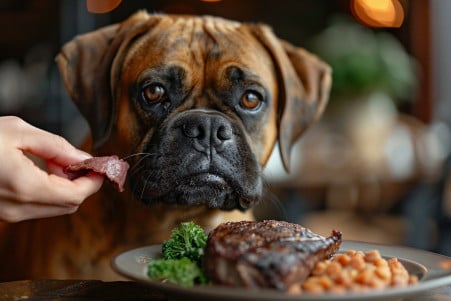Can Dogs Eat Corned Beef? Understanding the Risks and Alternatives
18 February 2024 • Updated 18 February 2024

You might want to let your furry friend in on the deliciousness that is corned beef, but is it a good idea? Dogs cannot eat corned beef because of its high salt content, which can lead to salt poisoning, dehydration, and other health problems in dogs. As a result, it’s best to avoid giving this meat to dogs and instead stick to treats that are safe for dogs.
To better understand the risks of giving corned beef to dogs, we’ll look at veterinary nutrition research and dog feeding recommendations. We’ll also discuss how high levels of sodium and specific preservatives in foods like corned beef can affect dogs.
We’ll also cover some alternatives for making sure your dog gets safe sources of protein in their diet, including the importance of choosing the right treats for your dog’s health. This knowledge is intended to help you make the best choices for your pet’s diet.
Can dogs eat corned beef?
Risks of High Sodium in Corned Beef for Dogs
One of the most serious risks of feeding corned beef to dogs is salt poisoning, also known as hypernatremia. This type of toxicity occurs when the sodium levels in a dog’s blood become too high, causing the body to pull water out of its cells, which can lead to dehydration and neurological symptoms.
The American Kennel Club notes that signs of salt poisoning can include vomiting, diarrhea, and lethargy, and in more severe cases, tremors, seizures, or coma. Immediate veterinary care is necessary, and treatment can include hospitalization, IV fluids, and close monitoring to help manage the symptoms.
Prevention is key to keeping your dog safe from this potentially life-threatening condition. Pet owners should make sure their dogs don’t have access to any foods or other items that are high in salt, according to the Pet Poison Helpline.
It’s also important to have your vet’s and poison helpline numbers on hand so you can act quickly if an emergency arises. By knowing the risks and how to avoid them, you can help ensure your dog stays safe and healthy and avoid an episode of salt poisoning.
What Does Sodium Do for Your Dog?
Sodium is important for maintaining the health of your dog. It helps to regulate the balance of fluids in the body, and it also supports the function of your dog’s organs and nervous system.
That said, it’s also important to remember that too much of a good thing can be a bad thing. According to Hill’s Pet, while sodium is important for the health of your dog and is often added to dog food to make it more palatable, too much can cause health problems like high blood pressure and worsening symptoms of heart disease.
Especially in older dogs and dogs with preexisting health conditions.
If your dog is getting too much sodium in their diet, it can disrupt their fluid balance and cause long-term health problems like high blood pressure and kidney damage. The American College of Veterinary Pharmacists says that if your dog has ingested too much sodium, you may notice symptoms like vomiting, diarrhea, depression, and tremors, which can occur within hours of your dog eating something with too much salt in it.
To keep your dog healthy, it’s important to make sure that they’re getting the right amount of sodium in their diet. This means feeding them a high-quality dog food with the right amount of sodium, like the options from Hill’s® Science Diet®, and being careful about the treats and table scraps that you give them since these can be high in salt.
As with most things in life, balance is the key to your dog’s health and well-being.
What Does Your Dog Need in Their Diet? The Role of Protein
Dogs are omnivores, which means they need a combination of proteins, carbohydrates, fats, vitamins, minerals, and water to be healthy. Of these nutrients, proteins are especially important because they help repair and build body tissues and support overall health.
According to VCA Animal Hospitals, proteins should come from both animal and plant sources to provide the necessary nutrients for a dog, and the quality and digestibility of the protein is more important than the source.
Protein is important for a dog’s health because it helps maintain muscle mass, supports hormone production, and provides energy. While animal proteins are considered complete proteins because they contain all the essential amino acids, plant proteins can be complete proteins if they’re combined in the right way.
For this reason, it’s important to make sure your dog is getting a high-quality puppy formula if they’re a puppy, and senior dog diets may need to be adjusted to include specific protein levels that support their changing body composition, according to VCA Animal Hospitals.
When it comes to choosing protein sources for your dog, make sure you’re choosing high-quality proteins that don’t contain too much salt or other unhealthy additives. WebMD suggests looking for dog foods that are nutritionally complete and balanced, including a good amount of protein according to AAFCO guidelines.
If you’re mindful of the protein sources you’re choosing and make sure your dog’s diet is well-rounded, you can help ensure that your dog lives a long, healthy life.
Healthy Ways to Cook Dog-Friendly Meats
Cooking meat for your dog is a great way to make sure that they are eating a healthy and safe diet. To make sure that the meat is safe from bacterial contamination and easy to digest, it’s best to boil, bake, or grill the meat without adding any salt or other seasonings.
Cooking the meat to an internal temperature of 170 degrees Fahrenheit, as recommended by Hearthstone Homemade Dog Food, will ensure that any bacteria is killed while the protein is preserved. Recipes.net recommends using lean cuts of chicken, turkey, beef, or fish like salmon, which is high in omega-3 fatty acids, and boiling the meat for simplicity or baking it to help it maintain its natural flavors.
Once the meat is cooked, you can mix it in with your dog’s regular food to give them a protein boost or serve it to them as a healthy snack.
Cooking the meat properly is important for both safety and preserving the nutrients in the meat. It’s also important not to overcook the meat, which can destroy its nutrients, as noted by Dogs Best Life.
To make sure that the meat is cooked in a way that keeps it juicy and tender so that your dog will enjoy it, it’s important to follow these guidelines for cooking and serving meats to your dog.
By following these guidelines for cooking and serving meats to your dog, you can make sure that they get the protein they need while avoiding the health problems that can come from the high sodium and processed nature of corned beef and other deli meats.
Varying Your Dog’s Protein Sources
Protein is an essential part of your dog’s diet, but not all protein sources are created equal, especially because of the high sodium levels in corned beef.
There are other animal and plant-based protein sources that can provide the nutrients your dog needs without the potential downsides.
Pet Honesty explains that the best animal proteins for dogs are beef, turkey, chicken, lamb, and salmon because they all contain essential amino acids that are important for maintaining muscle and overall health. Plant proteins can also be included in a dog’s diet as long as they are supplemented with the amino acids that are found in animal proteins.
It’s important to know the signs of a protein deficiency, which are outlined by Pet Honesty.
A dull coat, slow growth, and muscle loss are all signs that your dog may not be getting enough protein.
If you notice these signs, a veterinary nutritionist can help you make the right dietary changes to make sure that your dog’s protein needs are being met.
It’s also important to make sure that you’re choosing the right protein sources based on your dog’s allergies and other health conditions.
For example, a study published on PubMed found that lamb is a good choice for dogs with allergies because it’s less allergenic, and lean meats like chicken and turkey are good choices for dogs with kidney issues because they have a lower phosphorus content.
It’s important to make sure that you’re taking your dog’s individual needs, energy levels, and health into account when you’re choosing these protein sources. You should also make sure that you’re varying the protein sources that you’re feeding your dog to make sure that they’re getting a good balance of nutrients and to keep them from getting bored with their meals.
By doing this, you can make sure that you’re keeping your dog healthy and avoiding dangerous foods like corned beef by choosing healthy, safe protein sources and working with your vet.
Final Thoughts on Dogs and Corned Beef
As we’ve discussed in this article, corned beef is not a good choice for dogs because of its high sodium content and the potential for salt poisoning. High-sodium foods can lead to a variety of health problems for dogs, including dehydration and neurological issues. While it’s important to make sure your dog gets enough sodium in their diet to support their bodily functions, too much can be dangerous.
It’s important for pet parents to monitor their dogs’ diets and know the signs of salt poisoning. It’s also important to make sure your dog is eating a well-balanced diet that meets their nutritional needs. This means choosing the right protein sources and cooking methods to make sure the food you feed your dog is not only tasty but also healthy and free of potentially dangerous additives.
If you’re thinking about changing your dog’s diet or if you think they may have eaten something toxic, it’s always best to talk to your vet. And always remember that your dog’s health and well-being depend on you making the right choices about their diet. By feeding them the right foods and making sure they get the right nutrients, you can help make sure your dog lives a long, healthy life.


